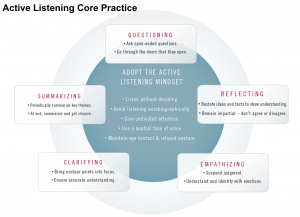“You cannot truly listen to anyone and do anything else at the same time.”
― M. Scott Peck
Hate. Vitriol. Accusations.
Fightin’ words.
When you log onto Facebook these days, or even Twitter (like me), you’d think that Americans despise each other. These times have robbed us of our kindness, stripped us of our humanity, reduced us to sides. Left, right. Conservative, liberal. Good, bad. Can we even have a conversation anymore?
Is listening gone?
Wouldn’t it be better if we could have a conversation – a real one, where we understood each other’s perspectives? Wouldn’t it be better if we found our common ground and merely disagreed on the specifics? If you zoom way out, we all want the same things – safety, love, progress. And if you look at the data, progress is happening. But that’s not what you’d think if you watched the news. Good news is gradual; bad news is sudden.
We need to do a better job of understanding the other side. We hide in our tribes, in our social feeds where everyone is like us – and it makes us forget that there’s truth outside of our bubbles.
False consensus hurts us all
This feeling of empowered tribalism is also known as the “false consensus effect.” We’re the sane ones. Look at all these other people who agree. Everyone else is wrong.
It’s unhealthy. But even worse, it’s unproductive – and not just in our personal lives. We’re not helping progress by shutting each other out and refusing to acknowledge victories we didn’t win ourselves.
So let’s figure out how to listen better. How do you listen? Have you thought about it, examined your process?
Last year, we had several great “learning opportunities” here at Far West Capital. I had to examine where we went wrong, and I realized that one of the biggest failures was mine: I hadn’t listened. Sure, I’d been in the meetings. I’d conducted one on ones with everyone in the company. But I hadn’t really heard.
Barriers to active listening
To actively listen, we have to do three things – and most of us don’t do them well.
Comprehending. Duh, first you have to understand what the other person is saying. Language differences, jargon differences, or simply the differences of our perspectives in life can keep us from this basic part of listening.
On Reddit, one of my favorite forums is called “Explain like I’m 5” in which people ask complicated questions about everything on the planet – and other users attempt to explain the answer in the simplest possible language. I think this is a good shortcut to comprehension, whether you’re asking someone to explain in simple terms or trying to do it yourself.
Retaining. This is the tough one. A lot of us jump to the response first, in our minds. We’ve already moved on, thinking of the story from our own experience we want to tell (known as autobiographical listening). We might only be holding onto what’s relevant for that response. We might be distracted, fatigued. Or our cognitive biases might be working against us. Heck, sometimes we’re just bad at remembering. Or we’re not picking up on nonverbal cues, on the emotions and passions surrounding what that person has said.
Responding. It’s a conversation, right? So we have to respond. But if we haven’t comprehended, haven’t retained, we can’t do this effectively. We may be mired in confirmation bias,
Developing active listening muscles
So, what can we do to listen better?
Understand your biases. Confirmation bias. False consensus effect. Availability bias. Anger bias. These – and others – are all at work in our arguments, and before we can rise above them, we have to understand them. This blog is a great resource for understanding those biases.
Reorient your argument. Have you tried steel-manning? You know the concept of a straw man, where you argue against the weakest possible argument that your opponent wasn’t even presenting; this is essentially its opposite, where you attempt to understand the opposing argument, look for evidence, and argue from that contrary perspective.
Wait. Allow the other person more time to lay out their argument.
Try to understand the core logic behind the argument. Socratic questioning is a really useful method here.
Minimize narcissism by watching your pronouns. Avoid “I” and “me.”
Develop a retention strategy. Whether you rely on electronic or handwritten notes, develop a consistent system. I had to change this for my one-on-one meetings, because I wasn’t retaining the most important takeaways. I started putting action items directly into Trello (our task management system) right after those critical conversations, and my retention improved.
Test your skills

The Stagen Academy, always helpful, has organized their active listening process into an easy-to-follow sheet – you can download it here.
They also have an easy exercise you can do with your team to test your new skills. The instructions:
Listener A asks open-ended questions, goes through the open doors, and asks follow-up questions.
Speaker B answers the questions.
After five minutes, switch roles.
Try it with something relatively simple – the office’s lunch plan for the next month, for example, or the virtue of cats vs. dogs as personal pets. (That one might get a bit testy. I speak from experience.)
What did you learn about your own biases? What listening tools will you adopt?
I’d love to hear any tactics that work for you. Tweet at me here or comment on this blog – I’d love to quote you.
Cole Harmonson is the president of Far West Capital, a company that funds the goals of high-growth entrepreneurs. Know a great company in need of capital to unleash their potential? Send them here, and we’ll give them a call.

